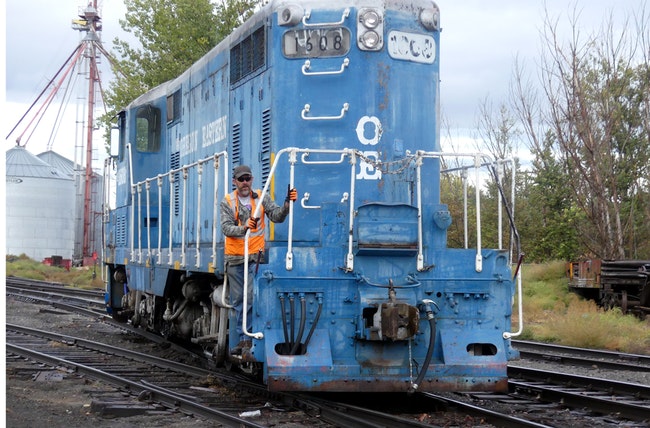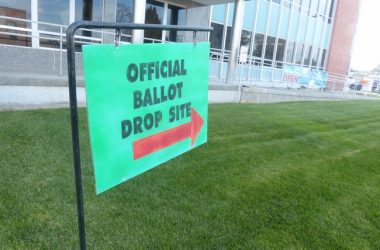
One of two diesel engines of the Oregon Eastern Railroad moves down the track in Vale. (The Enterprise/Pat Caldwell)
Let me explain why Malheur County’s latest effort to stiff arm public disclosure is troubling.
It’s about $14 million.
For more than two months, the Enterprise sought information from Malheur County officials on where they would get that sum.
That was the amount of money that County Judge Dan Joyce told the state was needed to build out county-owned industrial parks. (The county recently amended its plan, so now it needs about $12 million.)
Joyce wouldn’t answer questions about it. Neither would the other county commissioners or the county’s economic development agency.
But any one of them could have picked up the phone, granted an interview and in about 30 minutes the Enterprise – and citizens – would have the information.
Faced instead with county silence, we submitted a public records request.
Under Oregon law, government agencies are to presume that records they hold belong to the public and ought to be shared with the public.
The law allows a government to withhold certain information. The reasons they can do so count in the hundreds, such as protecting personal information about an individual or preserving an active police investigation.
But the point is the law is meant to protect citizen access to information about what its government is doing. That means any citizen can request the same information that the Enterprise has been requesting.
But back to that $14 million.
The Enterprise requested a broad range of records, trying to determine where that number came from, how Joyce concluded that Malheur County would have to come up with the money and whether Joyce and others had any idea where that millions would come from. You can read our request for yourself HERE.
With every request to Malheur County, we make a genuine offer.
Our requests are broad because we don’t know what documents exist or what information the county is holding. However, in every instance, we offer to “discuss how to narrow the request while producing meaningful public records.”
We understand county officials have work to do. We also don’t want to pay for documents we don’t need. Yet, the county usually doesn’t take us up on the offer to reduce the scope.
By law, government agencies have to produce the documents within 15 business days or as soon as reasonable. That’s three work weeks.
But our Dec. 30 request for information about the $14 million has gone into some sort of public records black hole. We’ve been advised it may be another week before we see any county response.
As we wait, the Enterprise last week asked for records held by the county about its dealings with Oregon Eastern Railroad. See the request HERE. The Vale-based railroad and local employer has been shut out from any role in the county’s rail shipping center. Since the county’s economic development agency isn’t supposed to take steps that harm a local employer, the Enterprise thought the public ought to learn why the local railroad is on the outside looking in.
The issue seemed more relevant when the Enterprise learned the county plans to buy its own train engine when locally-owned locomotives rumble just blocks from the county courthouse.
Greg Smith, the county’s economic development director, got right back to us on our records request.
He quoted state law that excused the county from complying with legal deadlines to provide the records: “The staff or volunteers necessary to complete a response to the public records request are unavailable.”
This seemed odd, so we asked Smith for clarification. He didn’t respond.
That circumstance, according to the Oregon attorney general, can be used only by “very small public bodies or in unusual circumstances.”
Malheur County certainly isn’t a “very small body.”
And understand that Smith isn’t running a shoestring operation. The county budgets $680,000 each year for economic development operations – including $180,000 paid to Smith’s company. The budget also includes $50,000 for rail project expenses, $40,000 for travel and $40,000 for promotion.
So, at this hour, the Enterprise has no idea when these records will come into public view.
So we wait.
We don’t submit requests for typing practice or to be annoying. This all takes a great deal of time for a very small news team. We have countless other stories in Malheur County to report on, from homelessness to the Owyhee Canyonlands to Hispanic student test scores.
But we persist because it’s clear many taxpayers in Malheur County expect us to act as their watchdogs. That’s why donations from $10 to $500 have flowed into to our Dollars for Disclosure fund. (You can still donate to help.)
This latest obstruction justifies any taxpayer who wonders: What’s the county trying to hide?
Les Zaitz is publisher and editor of the Enterprise. Email: [email protected]




